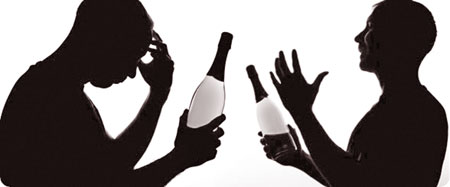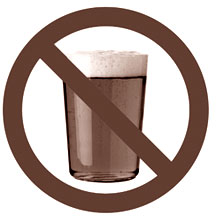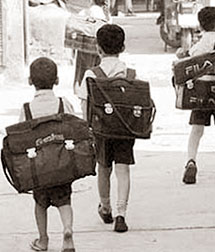
Psychiatrists join battle against booze
“How far, one diagnosed with an alcohol related illness, should
benefit from free healthcare should be taken into serious
consideration,” said the Minister. “Healthcare of poor innocent people
should be given priority.”
- Minister Maithreepala Sirisena
|

Bad behaviour was and is often brought on by the effects of alcohol |
The Buddha over two millennia ago spoke for every living being that
ever lived when He said ‘Sabbe pruthagjana unmaththaka’ (all living
beings are insane). Every one is suffering from some sort of mental and
psychological condition. But more often than not these psychological
conditions are brought on by us. The 2010 National Health Forum was held
last Tuesday and its’ theme was alcohol and ill health.
According to Dr. Lakshmi C. Somatunga, Director, mental Health,
Ministry of Health, as much as 75 percent of the total income of low
income families is wasted on alcohol.
“Some attempt to give scientific justifications for alcohol use, such
as a little bit of liquor is good for health” said Dr. Somatunga. “But
such claims are preposterous.” Reiterating this view Maithreepala
Sirisena, Minister of Health said, “Some who are considered as scholars
often claim that they perform better under the spell of liquor.
But in truth bad behaviour was and is often brought on by the effects
of alcohol.” Minister Maithreepala Sirisena explained that the ill
health effects brought on by alcohol runs as deep as the time of the
Buddha, when the tusker Nalagiri was sent to the Buddha drunk as
depicted in the Bodhiwamsa.
Dr. Firdosi Mehta, representative of the WHO (World Health
Organization) that attended the forum said the magnanimity of mental
health problems has been overlooked globally.
“Seventy percent of the people with psychological problems do not
seek medical help or do not continue treatment,” said Dr. Mehta. But he
said the attempt made by Sri Lanka to deal with mental health problems,
by way of expanding human resources and services, is commendable.
Drunkards
T.M.W.B Tennakoon, Medical Officer, Mental Health, District Hospital,
Siyambalanduwa said before he became a doctor he felt anger towards such
drunkards. “But after I became a doctor I started to feel pity. Only
after I started dealing with mental health I truly started to understand
what they must be going through.”
He explained that most of them drink because they suffer from OCD
(Obsessive-compulsive disorder), insomnia or anxiety along with several
other sociological factors such as lack of education, marriage at an
early age.
Based on many years of experience working with alcoholics and drug
addicts in Siyambalanduwa Dr. Tennakoon said the mainstay of the people
of Siyambalanduwa was chena cultivation. “Marijuana was used as a
medicine for simple illnesses as fatigue and stomach ache. It had become
a part of their life. You could not go along a creek without coming
across at least five moonshiners.” Dr. Tennakoon said.
The mental health implications of alcoholism and drug addiction are
enormous and have to be dealt with immediately. “Our approach was mainly
counseling.”
Their prevention plan for combating alcoholism started early as
school age. “We stood a better chance of winning this battle if we were
able to produce an intelligent young generation,” said Dr. Tennakoon.
I leperuma had been running a Chinese restaurant for more than four
years when he was in Siyambalanduwa when he started drinking due to peer
pressure. His friends kept on pestering him even after he closed up his
Chinese restaurant and started a new hotel. But fortunately an injury
sustained from a family quarrel due to his drunkenness brought him to
the attention of Dr. Tennakoon. “Dr. Tennakoon told me that if I kept at
this I could lose my family.” leperuma had been running a Chinese restaurant for more than four
years when he was in Siyambalanduwa when he started drinking due to peer
pressure. His friends kept on pestering him even after he closed up his
Chinese restaurant and started a new hotel. But fortunately an injury
sustained from a family quarrel due to his drunkenness brought him to
the attention of Dr. Tennakoon. “Dr. Tennakoon told me that if I kept at
this I could lose my family.”
On Dr. Tennakoon’s advice Ileperuma stopped drinking. “I’ve been
sober for almost three months now.” He said drinking exhausted his money
as well as time. “Al least now I can think straight,” admitted Ileperuma.
He observed that his health is much better. Ileperuma has bought a
three-wheeler and now drives his children to school because he is sober
enough to do so. In his own words ‘everything has changed’ fortunately
for the better.
The major obstacle Dr. Gamini Jayasinhe, Medical Officer, Psychiatry,
Base Hospital, Puttalam and his staff had to face was the locals’ view
that one to one and half bottles of alcohol is acceptable.
“In fact the wives of fishermen were expected to keep a bottle ready
for their husbands upon their return from the sea,” said Dr. Jayasinhe.
Dr. Gamini Jayasinhe and his team in devising their prevention program,
with the guidance of the Mental Health Division of the Ministry of
Health, made use of three internationally recognised models - universal
prevention, selective prevention and indicated prevention programs.
The universal prevention program involves promoting health and
wellbeing. It involved residential leadership programs for
schoolchildren, awareness programs for adults at grass roots level. “We
made it a point not to talk directly about alcohol to children instead
we strove to improve their life skills and leadership skills,” said Dr.
Jayasinhe.
He explained that most of the adults who took part in the adult
awareness program were women. “They were very keen on getting to know
how to stop their husbands from drinking.”
Moreover, traditional dances were conducted at school level to
enhance artistic thinking. “Our intention was to relieve psychological
tension and improve mental health through artistic discipline”, said Dr.
Jayasinghe.
Under the selected prevention program workshops were conducted for
identified selected populations such as the elders and schoolchildren.
“We also conducted a special training program for Gramaniladhari’s,
volunteers and teachers on mental health, suicide, drugs and alcohol
abuse and how to identify people with psychological conditions and
provided with educational material such as pamphlets”, said Dr.
Jayasinghe.
These people were then made in charge of different villages. “We just
provided them with the knowledge and support, later they became quite
capable of creating awareness in their respective villages”, explained
Dr. Jayasinghe.
With the indicated prevention program group therapy was conducted for
the addicts at the Base Hospital. “Due to the close doctor-patient
relationship we were able to maintain, they started feeling guilty about
drinking.”
Therapy sessions
These group therapy sessions have proven so successful that the
participants increased with time. “During these sessions we tried to
make them understand the damage alcohol cause, the relationships
affected, such as the relationship between the spouse and between
addicts and their parents and their children”, explained Dr.
Jayasinghe.He said the spouse was never left out of the loop.
“We gave the wives of addicts a chance to get actively involved by
teaching them how to react to an addict who was trying to quit, how to
be more loving and caring.”
No medication was used in their treatment of alcoholics, their
program solely depended on counseling in an attempt to rehabilitate them
psychologically.
Dr. Jayasinhe claimed that the success of their battle against
alcoholism was due to their satisfactory social network, backed by
social workers, volunteers and trained groups all working together
towards a common goal.
Dr. Ranga Chandrasena, Medical Officer, Mental Health (Focal point),
Polonnaruwa District said health education alone is no longer adequate
to bring alcoholism under control. “In addition to this we also focused
on health promotion for three categories - teenagers, adults who consume
alcohol occasionally and alcohol dependants”, said Dr. Chandrasena.
He pointed out that male children of alcoholic fathers often become
alcohol dependents in later years. “This has been a vicious cycle we
wanted desperately to break.” Their first step was to promote health
education through large scale awareness programs and the second step was
health promotion through discussions.
“Teachers play an important role in educating children. We conducted
a special awareness program for teachers, while special discussions were
held for adults who consumed alcohol occasionally.”
For their category three people - alcohol addicts - Dr. Chandrasena
and his team devised an ingenious group discussion method. “These people
were referred to a group of no more than 10 individuals who have quit
drinking.”
According to Dr. Chandrasena this method has proved quite successful.
Special focus was made on the role of females. “The predicament of
alcoholism would not have gone this far if female children were
discouraged from marrying or getting romantically involved with alcohol
addicts.”
But Ministry of Health and its’ district representatives are not the
only authorities saddled with the difficult task of dealing with
alcoholism.
The Commissioner General of Excise Wasantha Hapuarachchi said that
the increased taxes was to discourage alcohol consumption. “No matter
how many raids we conduct it wont make much of a difference. So although
we are a law enforcement authority we had to go beyond that” explained
Wasantha Hapuarachchi.
To date the Department of Excise has conducted many awareness
programs, introduced alternative activities such as street dramas,
alternative livelihoods for illegal brewers. “But to turn this
completely around we need a transformation of social attitudes” said
Wasantha Hapuarachchi.
Addiction
Minister Maithreepala Sirisena emphasized that the main focus of
programs combating alcoholism should be schoolchildren.
“Schoolchildren’s addiction to drugs and trafficking using
schoolchildren is a major problem that has to be swiftly dealt with by
all authorities involved irrespective of party differences.”
However, the Minister pointed out that by raiding illicit liquor
producers, profits gained by licensed liquor producers increase. “This
is a complex issue. While we are striving to enforce law on illegal
liquor production authorities must also attempt to control legal liquor
production” said the Minister and suggested that to maintain an
equilibrium an income tax must be enforced on licensed liquor producers.
He also reiterated the importance of introducing more innovative
awareness creation methods on ill health and socio-economical effects of
alcoholism.
“How far, one diagnosed with an alcohol related illness, should
benefit from free healthcare should be taken into serious consideration”
said the Minister.
“Healthcare of poor innocent people should be given priority.” Prof.
Carlo Fonseka, Chairman National Authority on Tobacco and Alcohol and
George Perera, Alcoholics Anonymous were also present.
-SP
Ergonomic factors of educational environments
By Dr. Kapila Jayaratne
Consultant Community Physician Family Health Bureau,
Ministry of Health
 Ergonomics is the scientific study of the people and their work. It
helps in improving human performance and finds solutions to health and
safety problems. The school is the largest workplace of all. Children
are the “workers” there. Matched ergonomic arrangement at the place of
work is essential for better human performance. Ergonomics is the scientific study of the people and their work. It
helps in improving human performance and finds solutions to health and
safety problems. The school is the largest workplace of all. Children
are the “workers” there. Matched ergonomic arrangement at the place of
work is essential for better human performance.
Musculoskeletal pain, general tiredness, lateral deviation of the
spine and poor educational performance have been identified as key
negative effects due to mismatched ergonomics in the classroom.
Feasible solutions are available to mitigate ergonomic risks. Many
developed countries have contemplated on both micro and macro ergonomic
preventive strategies. The classical ergonomic approach is based on the
study of human characteristics and environmental parameters. This
knowledge needs to be applied in the analysis and redesign of total
environment.
Study
A school-based cross-sectional study was conducted in a
representative district (Gampaha) to analyse the ergonomic factors of
school educational environments and negative health outcomes among
school children with the objective of translating findings of research
into action with key stakeholders.
 A sample of 1607, school children of Grade 6,7 and 8 were selected
from 55 schools using stratified multi-stage cluster sampling method. A sample of 1607, school children of Grade 6,7 and 8 were selected
from 55 schools using stratified multi-stage cluster sampling method.
The study included 52% male and 48% female students from urban
(31.7%) and rural (68.3%) schools. They carried books in backpacks
(79.6%), shoulder bags (17.9%) and suitcases (2.3%). Mean weight of
schoolbag was 3.72 Kg. Mean schoolbag weight/body weight was 11.04%
(SD=3.88).
A bag weighing >10% of bodyweight (international cut-off) was carried
by 57.9% of children. They were seated with a mean angle of 30.71
degrees (SD=19.67) and 398.04cm (SD=132.09) mean distance to blackboard
with 23.3% having to turn their necks >45 degrees to see the centre of
the blackboard.
A standard chair with backrest without hand-rests was used by
95.6%.Regular use of backrest was reported by 12%. An individual desk
had been provided to 78.3%. Desk surface was horizontal in 84.9%. A
foot-rest was present in 82% desks.
Sitting area length of chairs did not match with buttock-popliteal
length of child in 87.3%. A mismatch in seat height and popliteal height
was observed in 79.8% while legroom height of desk did not comply with
popliteal height in 76.3%.
A larger proportion (71.2%) of children reported musculoskeletal pain
with 35.9% suffering from recurrent pain while 62.8% locating pain in
more than two anatomical points. Presence of mismatched seat
depth-buttock-popliteal length gave rise to 1.6 time risk of developing
recurrent musculoskeletal pain.
Carriage of backpack over both shoulders protected them from such
pain. Seventy two percent of children perceived discomfort due to
carriage of schoolbag. No correlationship was found between bag weight
and pain. Moderate to severe general tiredness was reported by 62%. Only
32 (2.35%) children found to have significant lateral deviation of the
spine. Academic performance or school attendance were not significantly
affected.
Research findings necessitated identification of priority areas and
formulation of feasible solutions with the involvement of major
stakeholders. Issues related to schoolbag were recognized as major
concerns. Solutions were contemplated on: strategies for bag-weight
reduction, introduction of a model healthy bag and bag behaviour change.
Findings were disseminated through local mass media and at international
forums to share and update good practice evidence.
Crucial role
Advocacy of policy makers, including Ministers of Health and
Education, played a crucial role. Sharing of research outcome and
recommendations with Ministry of Education (MoE) stimulated a secondary
research by MoE exploring strategies to lighten the schoolbag.
Text books were split into several volumes. Only page-80 exercise
books were recommended. A healthy schoolbag was modeled by the principal
investigator according to ergonomic standards. Sri Lanka Standards
Institution was consulted for physical quality assurance.Bag
manufacturers were registered and were educated on healthy bag.
Children, Parents and teachers were made knowledgeable through mass
media, leaflets and at exhibitions on healthy bag and bag behaviour.
A schoolbag regulatory committee was established to monitor
implementation of national healthy schoolbag campaign.This pioneer
public health sector research work led to a successful healthy schoolbag
campaign at national level in Sri Lanka.
The Oration made by Dr. Kapila Jayaratne on ‘ Ergonomic Factors of
Educational Environments and Influence on School-going Early
Adolescents’ at the 123rd Annual Scientific Session of the SLMA |

